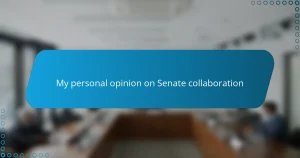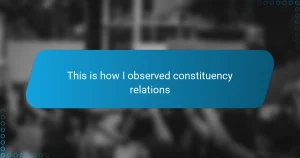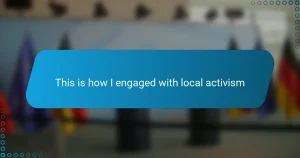Key takeaways
- Community leaders play a crucial role in bridging gaps between residents and officials, focusing on unity and genuine care.
- Identifying influential community leaders often involves recognizing those who work quietly and consistently to support their neighbors.
- Effective collaboration and trust-building with leaders require patience, empathy, and consistent follow-through on commitments.
- Sharing political views should prioritize clarity and respect, fostering a two-way dialogue for meaningful civic engagement.

Understanding Community Leaders Roles
Community leaders are often the unsung heroes who shape the heartbeat of neighborhoods. I’ve noticed that their role goes beyond just organizing events or voicing concerns; they bridge gaps between residents and officials, translating community needs into actionable plans. Have you ever paused to think about the weight they carry in balancing diverse interests while fostering unity?
From my experience, understanding their responsibilities requires appreciating the emotional labor involved. These individuals invest time and passion, often without recognition, to ensure their community thrives. It made me realize that leadership at this level isn’t just about authority—it’s about genuine care and resilience.
What struck me most was how community leaders become the trusted voices that empower others to participate in democracy. They nurture dialogue where it might otherwise falter, reminding me that political change starts with listening and connecting on a local scale. Isn’t it inspiring how much influence one dedicated person can have?

Identifying Key Community Leaders
Sometimes, identifying key community leaders means looking beyond formal titles. I’ve found that the most influential people are often those quietly working behind the scenes—organizing food drives, mentoring youth, or simply lending an ear at neighborhood meetings. Have you ever noticed someone everyone turns to, even if they don’t hold an official position?
In my experience, the best way to spot these leaders is through observing connections. Who actively brings people together? Who earns respect not by demanding it, but by consistently showing up and delivering on promises? These are the people shaping the community’s future without fanfare, and recognizing them feels like uncovering hidden treasures.
It can be humbling to realize that leadership isn’t always loud or visible. Sometimes, it’s the gentle voice that speaks up in quiet spaces or the tireless volunteer who never seeks applause. Once I started paying attention to these nuances, my understanding of community dynamics deepened—and I began to appreciate leadership as a mosaic of many small, meaningful acts.

Approaching Leaders Effectively
Approaching community leaders effectively, I’ve learned, starts with genuine respect for their time and challenges. Instead of launching into requests, I take a moment to listen—to understand their priorities and concerns first. Have you ever experienced how showing true interest opens doors that formal introductions can’t?
I remember once reaching out to a leader after a local meeting. Rather than diving into my agenda, I asked about their recent projects and struggles. That small gesture shifted the conversation from transactional to authentic, and suddenly collaboration felt natural. It’s surprising how a simple approach grounded in empathy can build lasting trust.
What I found crucial, too, is being clear but flexible about what I’m seeking. Community leaders juggle many responsibilities, so framing my ideas as opportunities rather than demands makes them more willing to engage. Have you noticed how people respond better when they feel they’re part of a shared purpose, not just a checklist?

Building Trust with Leaders
Building trust with community leaders, in my experience, begins with showing up consistently and following through on commitments. I’ve seen how trust isn’t granted after one meeting but earned over time by being reliable and sincere. Have you ever noticed how small actions, like remembering a leader’s concern or honoring their time, make a big difference in building genuine rapport?
I recall a moment when I acknowledged a leader’s expertise openly during a discussion. That simple act of respect created a pivot point—it transformed our interaction from cautious to collaborative. It reminded me that trust grows when leaders feel valued not just for their position but for their insight and experience.
Trust also means embracing transparency and humility. I’ve learned that admitting what I don’t know invites openness rather than judgment. When community leaders see honesty paired with a willingness to learn, it lays a foundation for stronger connections that can weather challenges together. Doesn’t that kind of mutual respect feel like the heart of all meaningful relationships?

Sharing Your Political Views
Sharing your political views with community leaders can feel daunting at first, but I’ve found that honesty and clarity make all the difference. I remember nervously expressing my opinions during a local forum and was surprised how openly leaders welcomed my perspective when I spoke from the heart. Have you ever noticed that when you’re straightforward yet respectful, conversations not only flow easier but also create space for real understanding?
It’s also important to tailor your message to the audience. Community leaders juggle diverse concerns, so framing your views around shared goals helped me connect more effectively. I often asked myself, “How does this issue impact our community?” and then spoke to that, rather than just airing personal opinions. Have you tried this approach and felt how it shifts the tone from debate to collaboration?
Sometimes, sharing political views means listening as much as talking. I recall moments when pausing to hear a leader’s viewpoint gave me insights I hadn’t considered, enriching my own stance. Doesn’t it feel empowering when dialogue becomes two-way, and both sides grow from the exchange? This balance, I believe, is the foundation of meaningful civic engagement.

Collaborating on Community Issues
Collaborating on community issues really deepened my appreciation for how much passion and persistence leaders pour into local challenges. I once worked alongside a neighborhood group tackling a public safety concern, and saw firsthand how ideas evolve when people come together with a shared purpose. Have you ever noticed how collaboration turns isolated frustrations into collective energy?
What struck me most was how collaboration requires patience and humility. In one instance, a proposed solution needed several rounds of adjustment before it resonated with everyone involved. It reminded me that effective teamwork isn’t about quick wins but about honoring different perspectives and finding common ground, even when it’s messy.
I found that showing genuine commitment by attending meetings regularly and following up on small tasks built trust that opened doors for deeper collaboration. Isn’t it amazing how consistent presence and follow-through transform relationships from formal to truly cooperative? Working hand-in-hand with leaders not only advances community goals but also nurtures a sense of belonging that can’t be rushed.

Reflecting on Connection Experiences
Reflecting on my experiences connecting with community leaders, I’ve realized how much these interactions taught me about patience and listening. There was a time when I thought I could jump straight into offering solutions, only to find that true connection required me to first understand the layers beneath their concerns. Have you ever felt that moment when you finally grasp someone’s perspective and the conversation shifts in a more meaningful direction?
I also noticed the emotional complexity involved—these leaders carry hopes, frustrations, and a deep responsibility that isn’t always visible at first glance. When I acknowledged these feelings openly, it seemed to create a space where trust and empathy flourished naturally. Isn’t it fascinating how vulnerability can become a bridge rather than a barrier?
Looking back, each connection felt like peeling back a layer, revealing not just challenges but also shared values and aspirations. Those moments made me appreciate that building relationships in political spaces is less about changing minds immediately and more about cultivating mutual respect over time. Don’t you think that approach leads to stronger, more lasting impact?


